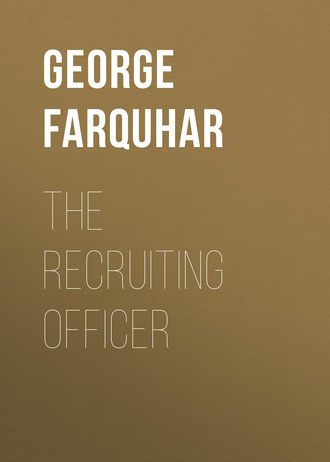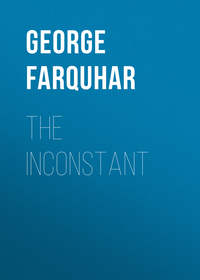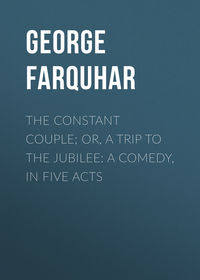 полная версия
полная версияThe Recruiting Officer
Plume. Pho! let me see it. [Opening the Letter.] If she be a jilt – Damn her, she is one – there's her name at the bottom on't.
Wor. How! then I'll travel in good earnest – By all my hopes, 'tis Lucy's hand.
Plume. Lucy's!
Wor. Certainly – 'tis no more like Melinda's character, than black is to white.
Plume. Then 'tis certainly Lucy's contrivance to draw in Brazen for a husband – But are you sure 'tis not Melinda's hand?
Wor. You shall see; where's the bit of paper I gave you just now that the devil wrote Melinda upon?
Kite. Here, sir.
Plume. 'Tis plain they are not the same; and is this the malicious name that was subscribed to the letter which made Mr. Balance send his daughter into the country?
Wor. The very same: the other fragments I showed you just now.
Plume. But 'twas barbarous to conceal this so long, and to continue me so many hours in the pernicious heresy of believing that angelic creature could change. Poor Sylvia!
Wor. Rich Sylvia, you mean, and poor captain; ha! ha! ha! – Come, come, friend, Melinda is true, and shall be mine; Sylvia is constant, and may be yours.
Plume. No, she's above my hopes – but for her sake, I'll recant my opinion of her sex.
By some the sex is blam'd without design,Light harmless censure, such as yours and mine,Sallies of wit, and vapours of our wine:Others the justice of the sex condemn,And, wanting merit to create esteem,Would hide their own defects by censuring them:But they, secure in their all-conq'ring charms,Laugh at our vain attempts, our false alarms.He magnifies their conquests who complains,For none would struggle, were they not in chains.[Exeunt.ACT THE FIFTH
SCENE I
Justice Balance's House Enter Balance and ScaleScale. I say, 'tis not to be borne, Mr. Balance.
Bal. Lookye, Mr. Scale, for my own part I shall be very tender in what regards the officers of the army – I only speak in reference to Captain Plume – for the other spark I know nothing of.
Scale. Nor can I hear of any body that does – Oh! here they come.
Enter Sylvia, Bullock, Rose, Prisoners, andConstableConst. May it please your worships, we took them in the very act, re infecta, sir – The gentleman, indeed, behaved himself like a gentleman, for he drew his sword and swore, and afterwards laid it down and said nothing.
Bal. Give the gentleman his sword again – Wait you without. [Exeunt Constable and Watch.] I'm sorry, sir, [To Sylvia.] to know a gentleman upon such terms, that the occasion of our meeting should prevent the satisfaction of an acquaintance.
Syl. Sir, you need make no apology for your warrant, no more than I shall do for my behaviour – my innocence is upon an equal foot with your authority.
Scale. Innocence! have you not seduced that young maid?
Syl. No, Mr. Goosecap, she seduced me.
Bul. So she did, I'll swear – for she proposed marriage first.
Bal. What, then you are married, child? [To Rose.
Rose. Yes, sir, to my sorrow.
Bal. Who was witness?
Bul. That was I – I danc'd, threw the stocking, and spoke jokes by their bedside, I'm sure.
Bal. Who was the minister?
Bul. Minister! we are soldiers, and want no minister – they were married by the articles of war.
Bal. Hold thy prating, fool – Your appearance, sir, promises some understanding; pray, what does this fellow mean?
Syl. He means marriage, I think – but that, you know, is so odd a thing, that hardly any two people under the sun agree in the ceremony; but among soldiers 'tis most sacred – our sword, you know, is our honour, that we lay down – the Hero jumps over it first, and the Amazon after – Leap, rogue; follow, whore – the drum beats a ruff, and so to bed: that's all: the ceremony is concise.
Bul. And the prettiest ceremony, so full of pastime and prodigality —
Bal. What! are you a soldier?
Bul. Ay, that I am – Will your worship lend me your cane, and I'll show you how I can exercise?
Bal. Take it. [Strikes him over the Head.] – Your name, pray, sir? [To Sylvia.
Syl. Captain Pinch: I cock my hat with a pinch, I take snuff with a pinch, pay my whores with a pinch; in short, I can do any thing at a pinch but fight.
Bal. And pray, sir, what brought you into Shropshire?
Syl. A pinch, sir: I know you country gentlemen want wit, and you know that we town gentlemen want money, and so —
Bal. I understand you, sir – Here, constable —
Enter ConstableTake this gentleman into custody, till further orders.
Rose. Pray, your worship, don't be uncivil to him, for he did me no hurt; he's the most harmless man in the world, for all he talks so.
Scale. Come, come, child, I'll take care of you.
Syl. What, gentlemen, rob me of my freedom and my wife at once! 'tis the first time they ever went together.
Bal. Harkye, constable. [Whispers him.
Const. It shall be done, sir – come along, sir.
[Exeunt Constable, Bullock, and Sylvia.Bal. Come, Mr. Scale, we'll manage the spark presently.
[Exeunt.SCENE II
The Market Place Enter Plume and KitePlume. A baker, a tailor, a smith, butchers, carpenters, and journeymen shoemakers, in all thirty-nine – I believe the first colony planted in Virginia had not more trades in their company than I have in mine.
Kite. The butcher, sir, will have his hands full, for we have two sheep-stealers among us – I hear of a fellow, too, committed just now for stealing of horses.
Plume. We'll dispose of him among the dragoons – Have we never a poulterer among us?
Kite. Yes, sir, the king of the gipsies is a very good one; he has an excellent hand at a goose or a turkey – Here's Captain Brazen, sir. I must go look after the men.
Enter Brazen, reading a LetterBrazen. Um, um, um, the canonical hour – Um, um, very well – My dear Plume! give me a buss.
Plume. Half a score, if you will, my dear! What hast got in thy hand, child?
Brazen. 'Tis a project for laying out a thousand pounds.
Plume. Were it not requisite to project first how to get it in?
Brazen. You can't imagine, my dear, that I want twenty thousand pounds! I have spent twenty times as much in the service – But if this twenty thousand pounds should not be in specie —
Plume. What twenty thousand?
Brazen. Harkye – [Whispers.
Plume. Married!
Brazen. Presently; we're to meet about half a mile out of town, at the waterside – and so forth – [Reads.] For fear I should be known by any of Worthy's friends, you must give me leave to wear my mask till after the ceremony which will make me for ever yours.– Lookye there, my dear dog!
[Shows the Bottom of the Letter to Plume.Plume. Melinda! and by this light her own hand! Once more, if you please, my dear – Her hand exactly – Just now, you say?
Brazen. This minute; I must be gone.
Plume. Have a little patience, and I'll go with you.
Brazen. No, no, I see a gentleman coming this way that may be inquisitive; 'tis Worthy, do you know him?
Plume. By sight only.
Brazen. Have a care, the very eyes discover secrets.
[Exit. Enter WorthyWor. To boot and saddle, captain, you must mount.
Plume. Whip and spur, Worthy, or you won't mount.
Wor. But I shall; Melinda and I are agreed; she's gone to visit Sylvia, we are to mount and follow; and could we carry a parson with us, who knows what might be done for us both?
Plume. Don't trouble your head; Melinda has secured a parson already.
Wor. Already! do you know more than I?
Plume. Yes, I saw it under her hand – Brazen and she are to meet half a mile hence, at the waterside, there to take boat, I suppose, to be ferried over to the Elysian Fields, if there be any such thing in matrimony.
Wor. I parted with Melinda just now; she assured me she hated Brazen, and that she resolved to discard Lucy for daring to write letters to him in her name.
Plume. Nay, nay, there's nothing of Lucy in this – I tell ye, I saw Melinda's hand as surely as this is mine.
Wor. But I tell you, she's gone this minute to Justice Balance's country-house.
Plume. But I tell you, she's gone this minute to the waterside.
Enter a ServantServ. Madam Melinda has sent word that you need not trouble yourself to follow her, because her journey to Justice Balance's is put off, and she's gone to take the air another way. [To Worthy.
Wor. How! her journey put off?
Plume. That is, her journey was a put off to you.
Wor. 'Tis plain, plain – But how, where, when is she to meet Brazen?
Plume. Just now, I tell you, half a mile hence, at the waterside.
Wor. Up or down the water?
Plume. That I don't know.
Wor. I'm glad my horses are ready – I shall return presently.
[Exit.Plume. You'll find me at the Hall: the justices are sitting by this time, and I must attend them.
[Exit.SCENE III
A Court of JusticeBalance, Scale, and Scruple, upon the Bench;Constable, Kite, MobKite and Constable advanceKite. Pray, who are those honourable gentlemen upon the bench?
Const. He in the middle is Justice Balance, he on the right is Justice Scale, and he on the left is Justice Scruple, and I am Mr. Constable; four very honest gentlemen.
Kite. O dear, sir! I am your most obedient servant. [Saluting the Constable.] I fancy, sir, that your employment and mine are much the same; for my business is to keep people in order, and, if they disobey, to knock them down; and then we are both staff officers.
Const. Nay, I'm a serjeant myself – of the militia – Come, brother, you shall see me exercise. Suppose this a musket; now I'm shouldered.
[Puts his Staff on his right Shoulder.Kite. Ay, you are shouldered pretty well for a constable's staff, but for a musket you must put it on the other shoulder, my dear!
Const. Adso! that's true – Come, now give the word of command.
Kite. Silence.
Const. Ay, ay, so we will – we will be silent.
Kite. Silence, you dog, silence!
[Strikes him over the Head with his Halbert.Const. That's the way to silence a man with a witness. What do you mean, friend?
Kite. Only to exercise you, sir.
Const. Your exercise differs so much from ours, that we shall ne'er agree about it; if my own captain had given me such a rap, I had taken the law of him.
Enter PlumeBal. Captain, you're welcome.
Plume. Gentlemen, I thank you.
Scrup. Come, honest captain, sit by me. [Plume ascends, and sits upon the Bench.] – Now, produce your prisoners – Here, that fellow there, set him up. Mr. Constable, what have you to say against this man?
Const. I have nothing to say against him, an' please you.
Bal. No; what made you bring him hither?
Const. I don't know, an' please your worship.
Scale. Did not the contents of your warrant direct you what sort of men to take up?
Const. I can't tell, an' please ye; I can't read.
Scrup. A very pretty constable, truly. I find we have no business here.
Kite. May it please the worshipful bench, I desire to be heard in this case, as being the counsel for the king.
Bal. Come, serjeant, you shall be heard, since nobody else will speak; we won't come here for nothing.
Kite. This man is but one man, the country may spare him, and the army wants him; besides, he's cut out by nature for a grenadier; he's five feet ten inches high; he shall box, wrestle, or dance the Cheshire round with any man in the country; he gets drunk every Sabbath-day, and he beats his wife.
Wife. You lie, sirrah, you lie; an please your worship, he's the best natured pains-taking'st man in the parish, witness my five poor children.
Scrup. A wife and five children? you constable, you rogue, how durst you impress a man that has a wife and five children?
Scale. Discharge him, discharge him.
Bal. Hold, gentlemen. Harkye, friend, how do you maintain your wife and five children?
Plume. They live upon wild-fowl and venison, sir; the husband keeps a gun, and kills all the hares and partridges within five miles round.
Bal. A gun! nay if he be so good at gunning, he shall have enough on't. He may be of use against the French, for he shoots flying to be sure.
Scrup. But his wife and children, Mr. Balance?
Wife. Ay, ay, that's the reason you would send him away; you know I have a child every year, and you are afraid that they should come upon the parish at last.
Plume. Lookye there, gentlemen; the honest woman has spoke it at once; the parish had better maintain five children this year, than six or seven the next. That fellow, upon this high feeding, may get you two or three beggars at a birth.
Wife. Lookye, Mr. Captain, the parish shall get nothing by sending him away, for I won't lose my teeming-time, if there be a man left in the parish.
Bal. Send that woman to the house of correction, – and the man —
Kite. I'll take care of him, if you please.
[Takes him down.Scale. Here, you constable, the next. Set up that black-faced fellow, he has a gunpowder look; what can you say against this man, constable?
Const. Nothing, but that he's a very honest man.
Plume. Pray, gentlemen, let me have one honest man in my company, for the novelty's sake.
Bal. What are you, friend?
Mob. A collier; I work in the coal-pits.
Scrup. Lookye, gentlemen, this fellow has a trade, and the act of parliament here expresses, that we are to impress no man that has any visible means of a livelihood.
Kite. May it please your worship, this man has no visible means of a livelihood, for he works underground.
Plume. Well said, Kite; besides, the army wants miners.
Bal. Right, and had we an order of government for't, we could raise you in this and the neighbouring county of Stafford, five hundred colliers, that would run you under ground like moles, and do more service in a siege, than all the miners in the army.
Scrup. Well, friend, what have you to say for yourself?
Mob. I'm married.
Kite. Lack-a-day! so am I.
Mob. Here's my wife, poor woman.
Bal. Are you married, good woman?
Woman. I'm married in conscience.
Kite. May it please your worship, she's with child in conscience.
Scale. Who married you, mistress?
Woman. My husband: we agreed that I should call him husband, to avoid passing for a whore, and that he should call me wife, to shun going for a soldier.
Plume. A very pretty couple! What say you, Mr. Kite? will you take care of the woman?
Kite. Yes, sir, she shall go with us to the sea-side, and there, if she has a mind to drown herself, we'll take care nobody shall hinder her.
Bal. Here, constable, bring in my man.[Exit Constable.] Now, captain, I'll fit you with a man such as you never listed in your life.
Enter Constable and SylviaOh, my friend Pinch! I'm very glad to see you.
Syl. Well, sir, and what then?
Scale. What then! is that your respect to the bench?
Syl. Sir, I don't care a farthing for you, nor your bench neither.
Scrup. Lookye, gentlemen, that's enough; he's a very impudent fellow, and fit for a soldier.
Scale. A notorious rogue, I say, and very fit for a soldier.
Const. A whoremaster, I say, and therefore fit to go.
Bal. What think you, captain?
Plume. I think he's a very pretty fellow, and therefore fit to serve.
Syl. Me for a soldier! send your own lazy lubberly sons at home; fellows that hazard their necks every day, in the pursuit of a fox, yet dare not peep abroad to look an enemy in the face.
Const. May it please your worships, I have a woman at the door to swear a rape against this rogue.
Syl. Is it your wife, or daughter, booby?
Bal. Pray, captain, read the articles of war; we'll see him listed immediately.
Plume. [Reads. Articles of war, against mutiny and desertion, &c.
Syl. Hold, sir – Once more, gentlemen, have a care what you do; for you shall severely smart for any violence you offer to me; and you, Mr. Balance, I speak to you particularly, you shall heartily repent it.
Plume. Lookye, young spark, say but one word more, and I'll build a horse for you as high as the cieling, and make you ride the most tiresome journey that ever you made in your life.
Syl. You have made a fine speech, good Captain Huff-cap! but you had better be quiet; I shall find a way to cool your courage.
Plume. Pray, gentlemen, don't mind him, he's distracted.
Syl. 'Tis false! I am descended of as good a family as any in your county; my father is as good a man as any upon your bench, and I am heir to twelve hundred pounds a-year.
Bal. He's certainly mad. Pray, captain, read the articles of war.
Syl. Hold, once more. Pray, Mr. Balance, to you I speak; suppose I were your child, would you use me at this rate?
Bal. No, 'faith: were you mine, I would send you to Bedlam first, and into the army afterwards.
Syl. But consider my father, sir; he's as good, as generous, as brave, as just a man as ever served his country; I'm his only child; perhaps the loss of me may break his heart.
Bal. He's a very great fool if it does. Captain, if you don't list him this minute, I'll leave the court.
Plume. Kite, do you distribute the levy money to the men, while I read.
Kite. Ay, sir. Silence, gentlemen!
[Plume reads the Articles of War.Bal. Very well; now, captain, let me beg the favour of you not to discharge this fellow, upon any account whatsoever. Bring in the rest.
Const. There are no more, an't please your worship.
Bal. No more! There were five, two hours ago.
Syl. 'Tis true, sir; but this rogue of a constable let the rest escape, for a bribe of eleven shillings a man, because he said the act allowed him but ten, so the odd shilling was clear gains.
All Just. How!
Syl. Gentlemen, he offered to let me go away for two guineas, but I had not so much about me: this is truth, and I am ready to swear it.
Kite. And I'll swear it: give me the book – 'tis for the good of the service.
Mob. May it please your worship, I gave him half a crown, to say that I was an honest man; but now, since that your worships have made me a rogue, I hope I shall have my money again.
Bal. 'Tis my opinion, that this constable be put into the captain's hands, and if his friends don't bring four good men for his ransom by to-morrow night, captain, you shall carry him to Flanders.
Scale. Scrup. Agreed, agreed.
Plume. Mr. Kite, take the constable into custody.
Kite. Ay, ay, sir. [To the Constable.] Will you please to have your office taken from you? or will you handsomely lay down your staff, as your betters have done before you?
[Constable drops his Staff.Bal. Come, gentlemen, there needs no great ceremony in adjourning this court. Captain, you shall dine with me.
Kite. Come, Mr. Militia Serjeant, I shall silence you now, I believe, without your taking the law of me.
[Exeunt.SCENE IV
A Room in Balance's House Enter Balance and StewardStew. We did not miss her till the evening, sir; and then, searching for her in the chamber that was my young master's, we found her clothes there; but the suit that your son left in the press, when he went to London, was gone.
Bal. The white, trimm'd with silver?
Stew. The same.
Bal. You ha'n't told that circumstance to any body?
Stew. To none but your worship.
Bal. And be sure you don't. Go into the dining-room, and tell Captain Plume that I beg to speak with him.
Stew. I shall.
[Exit.Bal. Was ever man so imposed upon! I had her promise, indeed, that she would never dispose of herself without my consent – I have consented with a witness, given her away as my act and my deed – and this, I warrant, the captain thinks will pass. No, I shall never pardon him the villany, first, of robbing me of my daughter, and then the mean opinion he must have of me, to think that I could be so wretchedly imposed upon: her extravagant passion might encourage her in the attempt, but the contrivance must be his. I'll know the truth presently.
Enter PlumePray, captain, what have you done with our young gentleman soldier?
Plume. He's at my quarters, I suppose, with the rest of my men.
Bal. Does he keep company with the common soldiers?
Plume. No, he's generally with me.
Bal. He lies with you, I presume?
Plume. No, 'faith; the young rogue fell in love with Rose, and has lain with her, I think, since she came to town.
Bal. So that between you both, Rose has been finely managed.
Plume. Upon my honour, sir, she had no harm from me.
Bal. All's safe, I find – Now, captain, you must know, that the young fellow's impudence in court was well grounded; he said I should heartily repent his being listed, and so I do, from my soul.
Plume. Ay! for what reason?
Bal. Because he is no less than what he said he was – born of as good a family as any in this county, and he is heir to twelve hundred pounds a-year.
Plume. I'm very glad to hear it – for I wanted but a man of that quality to make my company a perfect representative of the whole commons of England.
Bal. Won't you discharge him?
Plume. Not under a hundred pounds sterling.
Bal. You shall have it, for his father is my intimate friend.
Plume. Then you shall have him for nothing.
Bal. Nay, sir, you shall have your price.
Plume. Not a penny, sir; I value an obligation to you much above an hundred pounds.
Bal. Perhaps, sir, you shan't repent your generosity – Will you please to write his discharge in my pocket-book? [Gives his Book.] In the mean time, we'll send for the gentleman. Who waits there?
Enter StewardGo to the captain's lodging, and inquire for Mr. Wilful; tell him his captain wants him here immediately.
Serv. Sir, the gentleman's below at the door, inquiring for the captain.
Plume. Bid him come up. Here's the discharge, sir.
Bal. Sir, I thank you – 'Tis plain he had no hand in't. [Aside.
Enter SylviaSyl. I think, captain, you might have used me better, than to leave me yonder among your swearing drunken crew; and you, Mr. Justice, might have been so civil as to have invited me to dinner, for I have eaten with as good a man as your worship.





